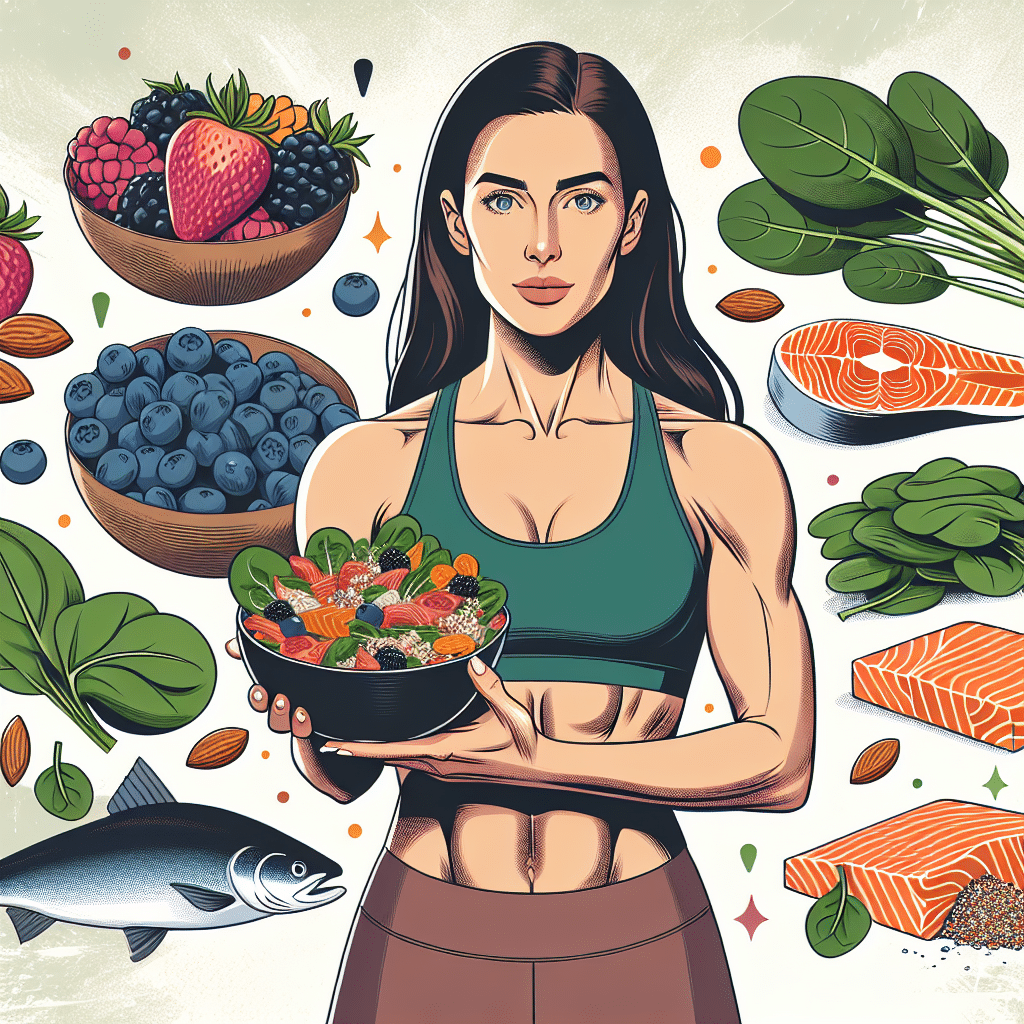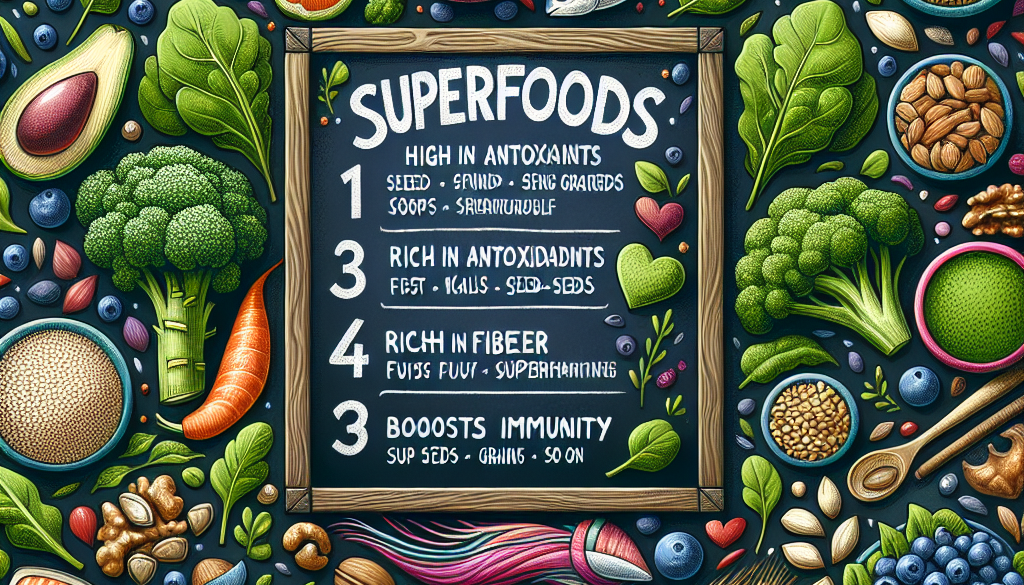What Are Superfoods and Why Are They Important?
-
Table of Contents
- Superfoods: Unveiling Their Significance for Optimal Health
- Understanding Superfoods
- The Importance of Superfoods in Your Diet
- Examples of Superfoods and Their Benefits
- Statistics Supporting the Benefits of Superfoods
- Conclusion: Embracing Superfoods for a Healthier Life
- Enhance Your Diet with ETprotein’s High-Quality Protein Products
Superfoods: Unveiling Their Significance for Optimal Health

In the quest for optimal health and nutrition, the term “superfoods” has become a buzzword in the wellness industry. These nutrient powerhouses pack large doses of antioxidants, polyphenols, vitamins, and minerals. Eating them may reduce the risk of chronic disease and prolong life, and people who incorporate more superfoods into their diet are healthier and thinner than those who do not. But what exactly are superfoods, and why should we pay attention to them? This article delves into the world of superfoods, exploring their benefits and importance in our daily diets.
Understanding Superfoods
Superfoods are foods—mostly plant-based but also some fish and dairy—thought to be nutritionally dense and thus good for one’s health. They contain a high volume of minerals, vitamins, and antioxidants. Antioxidants are natural molecules found in certain foods that help neutralize free radicals in our bodies. Free radicals are natural byproducts of energy production that can wreak havoc on the body. Antioxidant molecules decrease or reverse the effects of free radicals that have close links with the following health problems:
- Heart disease
- Cancer
- Arthritis
- Stroke
- Respiratory diseases
- Immune deficiency
- Emphysema
- Parkinson’s disease
Superfoods are not only beneficial for their antioxidant properties. They also offer various health benefits due to their rich nutrient profiles, which can help the body ward off diseases and keep it functioning properly.
The Importance of Superfoods in Your Diet
Integrating superfoods into your diet can offer a range of health benefits. Here are some reasons why they are important:
- Nutrient Efficiency: Superfoods are rich in nutrients compared to their caloric content. Consuming foods that are high in nutrients but low in calories can lead to better health.
- Disease Prevention: Superfoods contain high levels of antioxidants and polyphenols, which can help prevent coronary heart disease and cancer.
- Overall Health: Superfoods can contribute to a healthier diet, which is crucial in maintaining weight and combating obesity-related diseases.
- Longevity: With their high vitamin and mineral content, superfoods can help improve the longevity of life by preventing diseases that can shorten life expectancy.
Examples of Superfoods and Their Benefits
While there is no standardized criteria for determining what is or is not a superfood, here are some commonly recognized examples:
- Berries: High in fiber, berries are naturally sweet, and their rich colors mean they are high in antioxidants and disease-fighting nutrients.
- Leafy Greens: Dark, leafy greens are a good source of vitamin A, vitamin C, calcium, and several phytochemicals (chemicals made by plants that have a positive effect on your health). They also add fiber into the diet.
- Nuts and Seeds: Over the years, nuts and seeds have been among the best sources of plant proteins. Including them in your diet can lower the risk of developing heart disease or type 2 diabetes.
- Olive Oil: This oil is a good source of monounsaturated fats, which can help reduce both cholesterol levels and your risk of heart disease.
- Whole Grains: A source of both soluble and insoluble fiber, whole grains also offer several B vitamins, minerals, and phytonutrients. They have been shown to lower cholesterol and protect against heart disease and diabetes.
- Yogurt: A good source of calcium and protein, yogurt also contains live cultures called probiotics. These “good bacteria” can protect the body from other, more harmful bacteria.
- Cruciferous Vegetables: These vegetables are among the best sources of sulfur-containing compounds known as glucosinolates, which are substances that have been found to prevent cancer.
It’s important to note that no single food, including those labeled as “super,” can offer all the nutrition, health benefits, and energy we need to nourish ourselves. The 2015–2020 US Dietary Guidelines recommend healthy eating patterns, “combining healthy choices from across all food groups—while paying attention to calorie limits.”
Statistics Supporting the Benefits of Superfoods
Research has shown that superfoods can have a profound impact on health. For instance:
- According to a study published in the Journal of Nutrition, individuals who consume more than five servings of fruits and vegetables per day have a 20% lower risk of coronary heart disease and stroke, compared with individuals who consume less than three servings per day.
- A meta-analysis of 29 studies found that consuming nuts can reduce the risk of cardiovascular disease by approximately 30%, coronary heart disease by 45%, and cancer by 15%.
- The American Heart Association suggests that eating eight or more servings of fruits and vegetables every day can lower the risk of heart disease by as much as 30%.
Conclusion: Embracing Superfoods for a Healthier Life
In conclusion, superfoods are an essential part of a balanced diet. They provide numerous health benefits, from reducing the risk of chronic diseases to improving longevity. While they should not be the sole focus of our diets, incorporating a variety of these nutrient-rich foods can significantly contribute to our overall health and well-being.
Enhance Your Diet with ETprotein’s High-Quality Protein Products
If you’re looking to boost your intake of high-quality proteins and antioxidants, consider ETprotein’s range of organic bulk vegan proteins and L-(+)-Ergothioneine (EGT). Their products, including organic rice protein, pea protein, and various seed proteins, are non-GMO, allergen-free, and boast a neutral taste, making them an excellent addition to any health-conscious diet.
About ETprotein:
ETprotein, a reputable protein and L-(+)-Ergothioneine (EGT) Chinese factory manufacturer and supplier, is renowned for producing, stocking, exporting, and delivering the highest quality organic bulk vegan proteins and L-(+)-Ergothioneine. They include Organic rice protein, clear rice protein, pea protein, clear pea protein, watermelon seed protein, pumpkin seed protein, sunflower seed protein, mung bean protein, peanut protein, and L-(+)-Ergothioneine EGT Pharmaceutical grade, L-(+)-Ergothioneine EGT food grade, L-(+)-Ergothioneine EGT cosmetic grade, L-(+)-Ergothioneine EGT reference grade and L-(+)-Ergothioneine EGT standard. Their offerings, characterized by a neutral taste, non-GMO, allergen-free attributes, with L-(+)-Ergothioneine purity over 98%, 99%, cater to a diverse range of industries. They serve nutraceutical, pharmaceutical, cosmeceutical, veterinary, as well as food and beverage finished product distributors, traders, and manufacturers across Europe, USA, Canada, Australia, Thailand, Japan, Korea, Brazil, and Chile, among others.
ETprotein specialization includes exporting and delivering tailor-made protein powder and finished nutritional supplements. Their extensive product range covers sectors like Food and Beverage, Sports Nutrition, Weight Management, Dietary Supplements, Health and Wellness Products, and Infant Formula, ensuring comprehensive solutions to meet all your protein needs.
As a trusted company by leading global food and beverage brands and Fortune 500 companies, ETprotein reinforces China’s reputation in the global arena. For more information or to sample their products, please contact them and email sales(at)ETprotein.com today.














